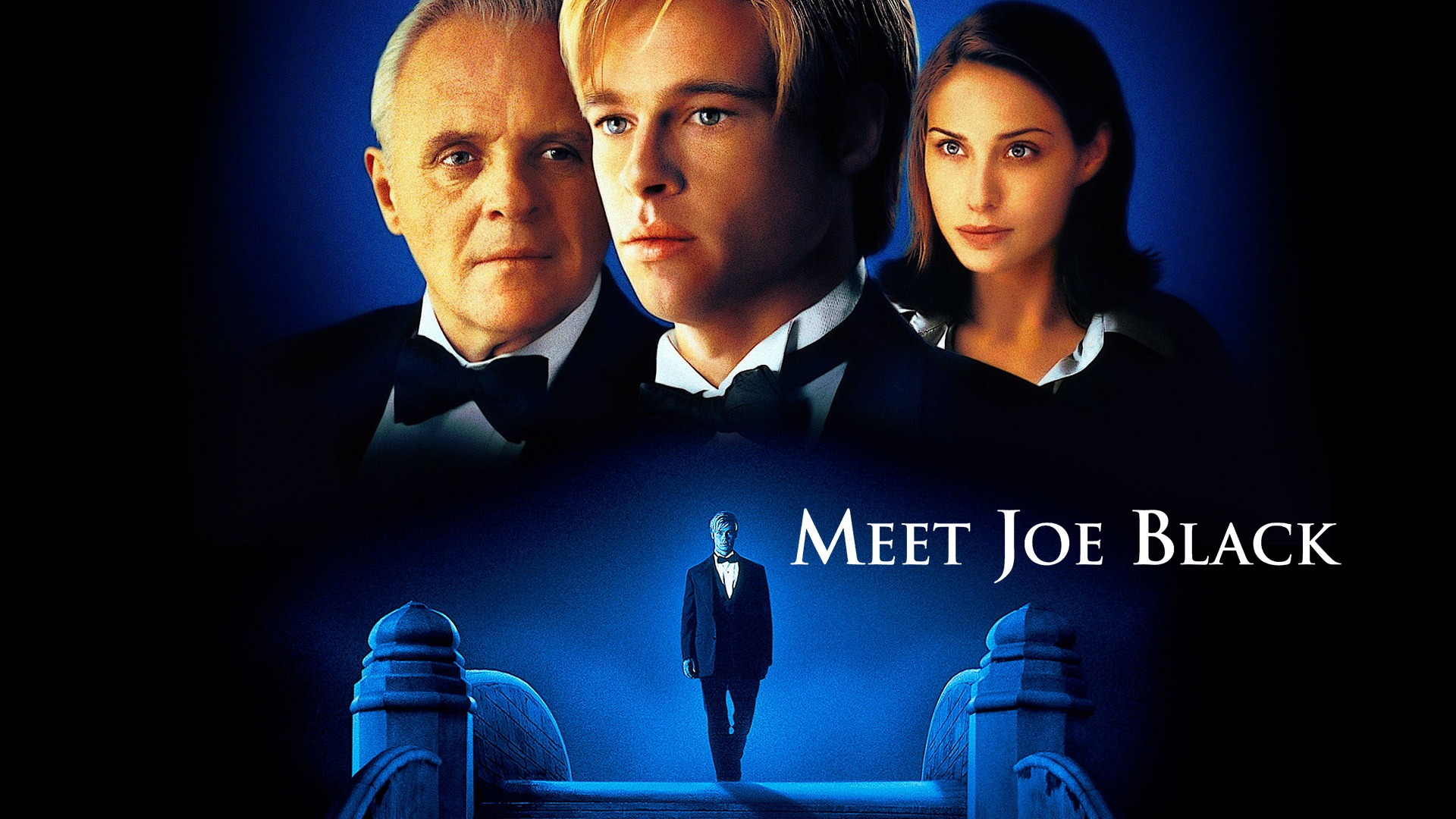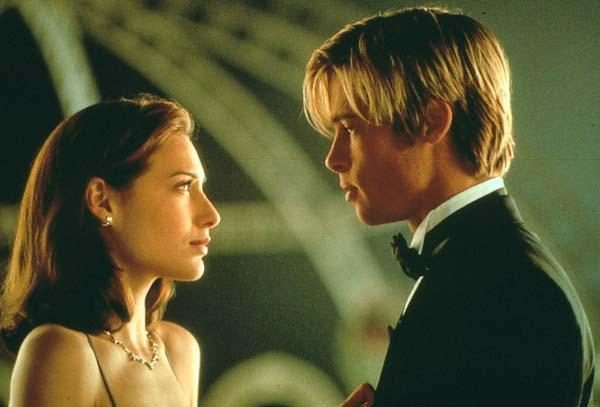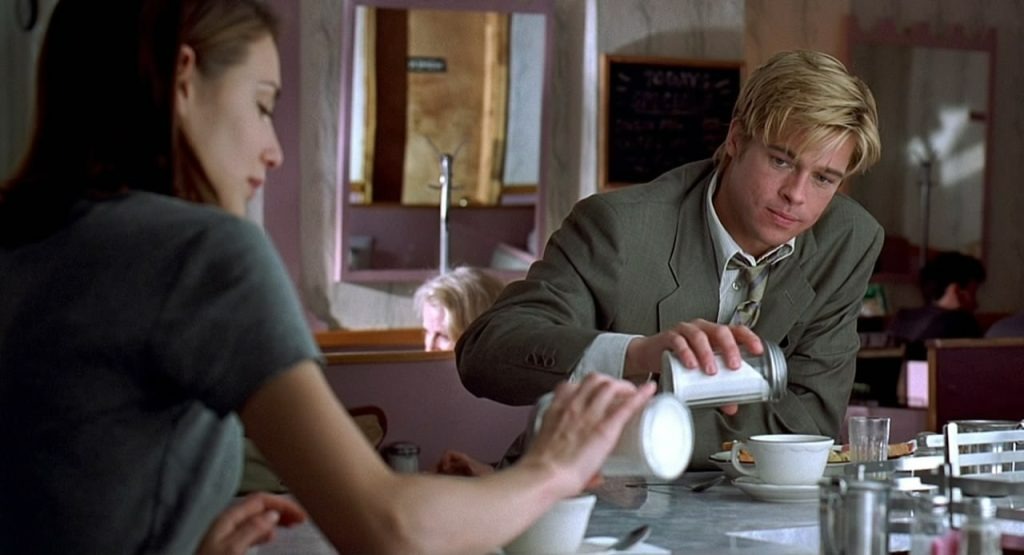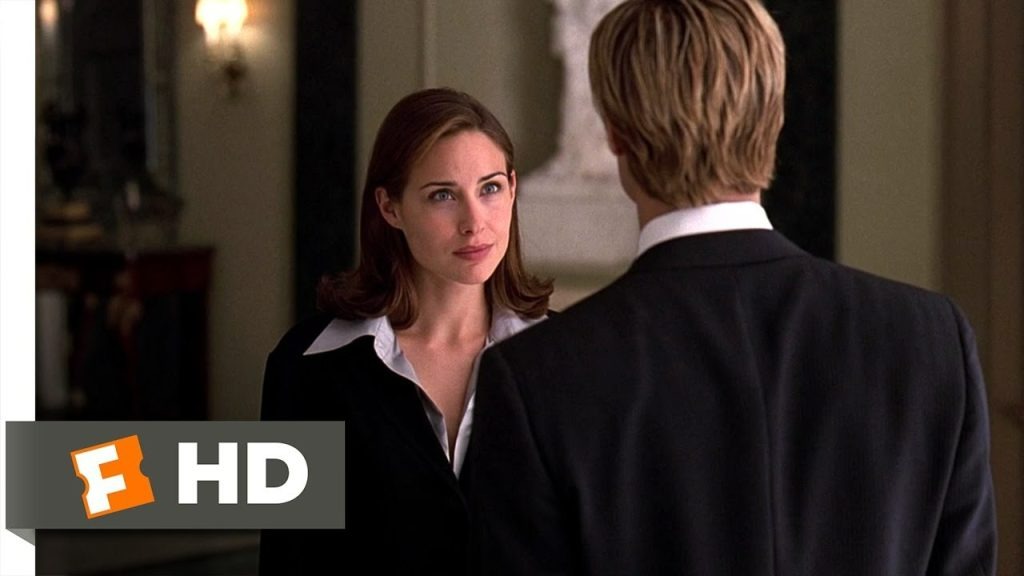
Meet Joe Black (1998) is a romantic fantasy drama film directed by Martin Brest, starring Brad Pitt, Anthony Hopkins, and Claire Forlani. Based on the 1934 film Death Takes a Holiday, the movie tells the story of Death itself personified as a young man named Joe Black, who takes on human form to experience life and understand the nuances of human existence. The film is known for its meditative approach to life, death, and the connections that define human relationships. While Meet Joe Black received mixed reviews from critics, it has since garnered a loyal following for its unique premise, emotional depth, and powerful performances.
The film explores profound themes surrounding mortality, the meaning of life, love, and the inevitability of death. Its philosophical undertones are balanced by elements of romance, family drama, and supernatural intrigue, making it a film that speaks to both the complexity of human relationships and the ultimate reality that all lives must eventually end. Through the lens of Death’s temporary experience of life, Meet Joe Black raises questions about the nature of existence and how we navigate the finite time we are given.
The story begins with Bill Parrish (Anthony Hopkins), a wealthy and influential media mogul, who is nearing the end of his life. At a critical moment when Bill experiences a heart attack, he encounters Death in the form of a mysterious young man (played by Brad Pitt). Death, who takes the name “Joe Black,” explains that he has come to claim Bill’s life. However, intrigued by the human experience, Joe strikes a deal with Bill: he will allow Bill some time to settle his affairs in exchange for allowing Joe to experience life as a human. Bill agrees, and Joe inhabits the body of a young man who has just died in a car accident, using his new form to walk among the living and observe the nuances of human emotions and connections.
During this time, Joe becomes particularly captivated by Bill’s daughter, Susan (Claire Forlani), who is a kind, intelligent, and compassionate woman. As Joe spends more time with Susan and her family, he develops a deep emotional attachment to her, even though he is, in essence, a being who exists outside of life and death. The love story between Joe and Susan is complicated by the fact that Joe is, in reality, not a human being, but an immortal force of nature, and his relationship with her is doomed from the start.
Meanwhile, Bill must come to terms with his own impending death while dealing with the corporate and familial pressures around him. As Joe learns more about love, relationships, and the complexities of the human condition, Bill’s family must grapple with the notion of saying goodbye to a man who has been both a father figure and a pillar of the community. As the story unfolds, the film delves into the emotional struggles of its characters as they confront the inevitable truth of mortality and the preciousness of time.
The central theme of Meet Joe Black is the inescapable nature of death. The character of Joe, who represents Death itself, is an embodiment of the idea that death is a natural, unavoidable part of life. Throughout the film, Death is depicted as not only a force of nature but also a curious and somewhat childlike figure. Joe’s interaction with humans offers him a chance to experience life, which ultimately enhances the poignancy of the story’s examination of mortality. His time as a human allows him to witness firsthand the profound depth of human relationships, love, and the fragility of life.
For Bill Parrish, the reality of his own impending death becomes a matter of reconciliation. As someone who has lived a life of success, wealth, and influence, Bill’s biggest struggle is coming to terms with the inevitability of his end. The film poignantly portrays the difficulty of facing one’s own mortality, especially when one has not yet had the opportunity to fulfill all of life’s desires. The portrayal of Bill’s relationship with his family—especially with his daughter, Susan—emphasizes the emotional struggle between wanting to leave a legacy and the desire to hold onto life for just a little longer.
Another important theme in Meet Joe Black is the exploration of love and human connection. The relationship between Joe and Susan is central to the narrative and, in many ways, acts as a metaphor for the fleeting nature of human life. Joe’s growing affection for Susan is bittersweet because, although he experiences human emotions, he is not fully capable of understanding or partaking in them in the same way that a living person would. His love for Susan is profound, but it is ultimately doomed by his true nature as Death.
For Susan, her relationship with Joe is an exploration of love, but it is also a confrontation with loss. She falls in love with a man who is not only emotionally distant and mysterious but is also, unknowingly to her, someone who cannot truly be with her forever. The emotional weight of their relationship highlights the idea that love is precious because it is temporary, and part of the beauty of love is in its impermanence.
The film also explores how love and connection extend beyond romantic relationships. Bill’s relationship with his family—especially with his daughters, Susan and her sister—demonstrates the value of family bonds. As Bill approaches the end of his life, his primary concern is ensuring that his family will be taken care of and that the connections he has fostered throughout his life will endure beyond his death.
Meet Joe Black is also an exploration of the human condition, particularly the way humans perceive and deal with time. Joe’s experience in a human body gives him an opportunity to witness firsthand how time shapes lives, relationships, and emotions. For Joe, time is an abstract concept; he is an eternal being who exists outside of time’s constraints. However, through his interaction with humans, he begins to understand the fragility and urgency of life.
This theme of time is particularly poignant in the film’s depiction of Bill’s struggle with the shortness of life. As a man who has achieved everything, he faces the fact that no amount of wealth or success can prevent death. His desire to make the most of his remaining time drives much of the film’s emotional intensity.

Director Martin Brest’s handling of Meet Joe Black is marked by a blend of visual grandeur and intimate storytelling. The pacing of the film is deliberate and contemplative, with long scenes that allow the characters to reflect on their emotions and relationships. This slower pace may have contributed to some mixed reviews, as critics found the film’s runtime and tone at times overly drawn-out. However, this pacing also contributes to the film’s meditative qualities and its ability to delve deeply into the themes of mortality and the meaning of life.
The cinematography, by Emmanuel Lubezki, is lush and visually arresting, with beautifully composed shots that evoke the sense of time passing. The film uses light and shadow to reflect the tension between life and death. The grand New York City setting also serves as a backdrop for the narrative’s exploration of legacy, with the Parrish family home acting as a symbol of the wealth, power, and human connections that Bill has cultivated throughout his life.
The film’s use of music, particularly the haunting score by Thomas Newman, also enhances its emotional resonance. The music underscores the film’s meditative atmosphere, helping to convey the poignancy of the moments when characters confront the inevitability of death. The score helps set the tone for the film’s reflections on love, time, and loss, guiding the audience through the emotional beats of the story.

The performances in Meet Joe Black are one of the film’s strongest aspects, particularly Brad Pitt’s portrayal of Joe. As Death, Pitt manages to strike a delicate balance between otherworldly aloofness and emotional vulnerability. His portrayal of Joe is at once ethereal and grounded, conveying the complexity of a character who is trying to understand the human experience while still being detached from it. Pitt’s performance is particularly impressive because he is tasked with portraying a being that is both a force of nature and a curious observer of life.
Anthony Hopkins delivers a powerful performance as Bill Parrish. His portrayal of a man grappling with his own mortality is both touching and deeply human. Hopkins’s ability to convey the weight of his character’s internal struggles—especially in scenes where he contemplates the legacy he will leave behind—adds emotional depth to the film. The chemistry between Hopkins and Pitt is central to the film’s exploration of life and death, as their contrasting characters interact in a way that feels both intimate and cosmic.
Claire Forlani also brings a great deal of heart to her role as Susan Parrish. Her performance reflects Susan’s emotional journey as she deals with the tension between her growing love for Joe and the knowledge that their relationship is impossible. Forlani’s portrayal is both delicate and strong, capturing the complexity of her character’s emotions as she comes to terms with the realities of life and loss.

Meet Joe Black is a film that invites its audience to reflect on some of life’s most fundamental and universal themes: mortality, love, time, and the human condition. Through its philosophical exploration of life and death, the film offers a poignant meditation on the value of human connection and the impermanence of life. While its pacing and tone may not appeal to everyone, Meet Joe Black stands out for its emotional depth, powerful performances, and unique premise. It is a film that resonates with those who are willing to embrace its slow, contemplative pace and its poignant exploration of what it means to truly live. Ultimately, Meet Joe Black reminds us that death is an inevitable part of life, but it is love, time, and
